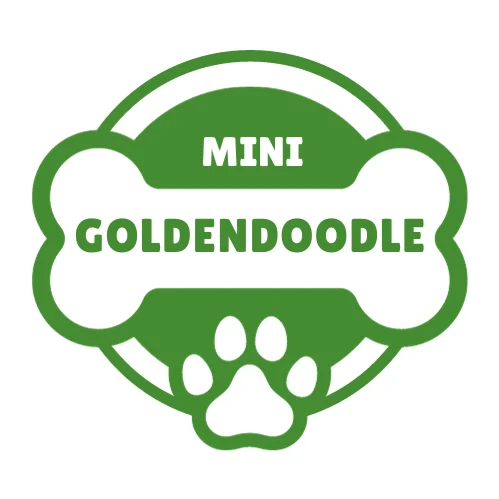
F1b mini Goldendoodle is a backcross hybrid breed that is the offspring of F1 mini Goldendoodle and Miniature Poodle. Breeders mix the genes of a hybrid breed with a purebred Poodle to create a predictable, hypoallergenic, and well-maintained second-generation hound.
In this comprehensive post, we will delve into the world of the f1b mini Goldendoodle full grown by elaborating on its size, health, and training. We will also discuss the factors that impact the F1b mini Goldendoodle full grown size and potential health issues. So, be with us to embark on a journey with the f1b mini Goldendoodle.
F1B Mini Goldendoodle
The f1b mini Goldendoodle is the baby of f1 mini goldendoodle and mini Poodle. It is a second-generation dog, with 75% of poodles and 25% of golden retrievers. Hence, the more genes of low shedding mini Poodle make it a hypoallergenic dog. In other words, it is the member of mini Goldendoodle’s family.
An F1b mini Goldendoodle in its adulthood is called an F1b mini Goldendoodle Full Grown.
Size of an F1B Mini Goldendoodle Full Grown
The f1b mini Goldendoodle full grown size is about 13-20 inches in height while 15-35 pounds in weight. These are just estimated factors and may change from dog to dog depending on numerous factors like age, genetics, gender, diet, exercise, and many more.
Factors that Impact the Size of F1B Mini Goldendoodle Full-Grown
Here are the top factors that impact the growth of your fib mini Goldendoodle full grown:
Genetics
The size of fib mini Goldendoodle mainly depends on the size of the parents. A poodle is a small size, while a Mini Goldendoodle is a giant dog in contrast to a Poodle. If a miniature Goldendoodle inherits the traits of a Poodle, it is expected to be a mini dog. On the other hand, the lineage of mini Goldendoodle makes it a little heavy.
Diet and Nutrition
Diet and nutrition play an important role in the growth of f1b mini Groodles. A balanced diet with a proper supply of proteins, vitamins, and other minerals keeps your mini companion healthy and well-groomed. On the other hand, a poor diet with an improper supply of essential elements makes your mini Groodle sick and suppressed.
Exercise
Proper exercise contributes greatly to the size of the f1b mini Goldendoodle. Regular exercise burns the extra fat of your mini friend, reducing the chances of obesity and sugar. Moreover, it also helps your dog to develop strong muscles and bones, which greatly impacts the dog’s size.
Through exercise, you can also stimulate the mental and physical condition of your dog.
Healthcare
Proper health care and veterinary checkups are crucial to maintaining the growth of mini f1b Goldendoodle. The reason is that health issues are the main obstacles to the size of mini f1b Goldendoodles. So, early detection and veterinary checkups are pivotal to ensure better growth.
Gender
Gender is another important aspect that impacts the size of the f1b mini Goldendoodle. In contrast to females, the male F1b mini Goldendoodle full-grown is inclined to be gained in terms of height and weight. The size of a male f1b mini goldendoodle is 13-20 inches in height and 20-40 pounds in weight. On the other hand, a female f1b mini goldendoodle is about 12-18 inches tall with a weight of 15-35 pounds.
Age
The age of the mini f1b mini Goldendoodle is an element that impacts its growth. For instance, a puppy has a smaller size than an adult f1b mini Goldendoodle. An adult f1b mini Goldendoodle compose a height of 13-20 inches with a weight of 15-40 pounds. A mini Goldendoodle puppy reaches adulthood at the age of 12-18 months.
Diseases in f1b mini Goldendoodle full grown

As a hybrid dog, a miniature F1b mini goldendoodle is less prone to fatal disease because breeders try their best to breed healthy genes. Despite these preventives, mini f1b Goldendoodles may develop some health issues that minimize their growth. Here is the list of the most common heath issues in f1b mini Goldendoodle full grown:
Hip Dysplasia
Hip dysplasia is a common health issue that disturbs the hip joints of f1b mini Goldendoodles. The bones and hip joints of mini dogs cannot develop properly, leading to pain, discomfort, and limited movement. Proper veterinary checkups and exercise help you to minimize hip dysplasia.
Elbow Dysplasia
It is like hip dysplasia but with some variations. In this disease, the elbow joints cannot move properly, leading to lameness and discomfort in mini G. Proper veterinary checkups and exercise help you to minimize elbow dysplasia.
Eye Problems
The F1b mini Goldendoodle may be prone to eye infection due to improved grooming and care. The eye diseases in mini dogs include PRA, cataracts, and glaucoma. Proper care and veterinary checkups are pivotal to preventing eye infections.
Allergies
The f1b mini Goldendoodle may be suspected of skin allergies as it inherits the curly coat from its Poodle parent. A curly coat is low shedding but still needs regular grooming and care to prevent tangles, mats, and infections.
Ear Infections
The floppy ears of f1b mini Goldendoodle may develop infections, moisture, and debris. The reason is that floppy ears limit the supply of air and light. Proper ear cleaning and hair trimming are necessary steps to reduce ear infections in mini F1b Goldendoodles.
Bloat
Bloat is a fatal health condition related to your dog’s stomach. It is the most common health issue in deep-chested dogs, in which the stomach twisted on itself. Try to feed small meals to your dog and avoid vigorous exercise after feeding.
Growth Stages of f1b mini Goldendoodle full grown
The f1b mini Goldendoodle steps through three main growth stages from puppyhood to adulthood. Here is a brief discussion on each:
Puppyhood: It is the fastest-growing age of mini f1b Goldendoodles, starting from birth to a few months of age. Proper diet, grooming, exercise, socialization, and basic training are crucial steps to take for a well-maintained dog.
Adolescence: It starts at the age of six months and is considered one of the challenging spans in mini f1b Goldendoodle puppies. Training is one of the most challenging and important parts of adolescence age. So, positive reinforcement, consistency, and patience are pivotal rather than punishment.
Adulthood: The f1b Mini Goldendoodle is considered an adult dog at the age of 12-18 months. Now, it is time to allow them to enjoy the world of unlimited possibilities and enjoyment. Congratulations! You are the owner of an f1b mini Goldendoodle full grown. Regular grooming and occasional veterinary checkups are crucial to prevent health issues and behavior problems.
Training and Its Impact on the Size f1b mini Goldendoodle full grown

Training plays a vital role in developing a well-maintained, obedient, and loyal f1b mini Goldendoodle full grown. Moreover, proper training also helps you to ensure well-sized and healthy dogs, preventing obesity, bone issues, and depression. In case of improper training and exercise, your dog may look weak and lower in size.
The following are the key areas you should focus on while training your f1b mini Goldendoodle:
Exercise
Exercise is one of the most important aspects of mini f1b Goldendoodle training. It includes learning to develop muscles, bones, and mental conditions. Regular exercise also reduces the chances of depression, anxiety, and other behavioral issues.
Diet Control
Learning how to eat is also an important lesson your mini f1b Goldendoodle should master. Teach your dog about the eating process by avoiding overfeeding.
Behavior and Grooming
Behavior training is of great importance, as it includes how to behave in different conditions. It includes understanding the commands, instructions, boundaries, and socialization. Grooming of mini Goldendoodle includes brushing, nail trimming, ear cleaning and many more. Moreover, mini Goldendoodle haircuts also plays a vital role to boost its personality.
Final words
In conclusion, the mini Goldendoodle full grown is a charming and unique breed that can vary in size due to factors like genetics, diet, exercise, healthcare, gender, and age. It’s essential to be aware of potential health issues and the different growth stages these dogs go through. Proper training is key to ensuring a healthy, well-sized, and well-behaved F1B Mini Goldendoodle full-grown.






